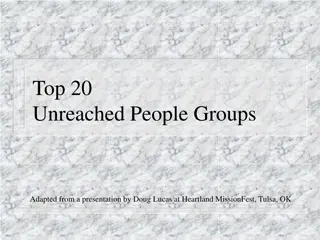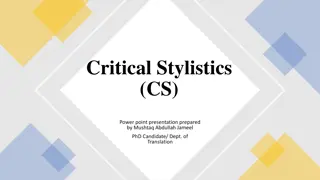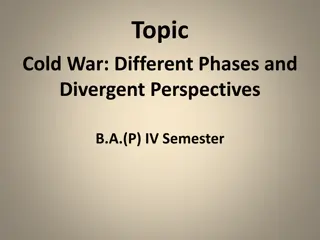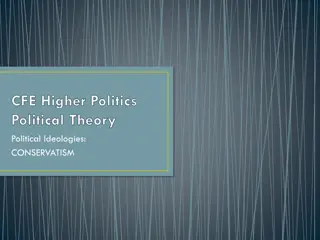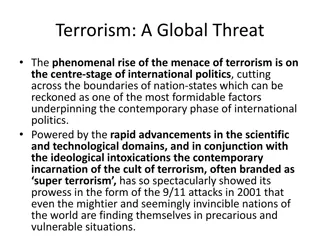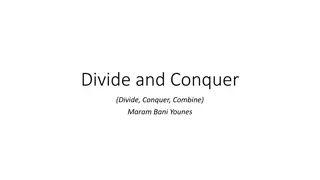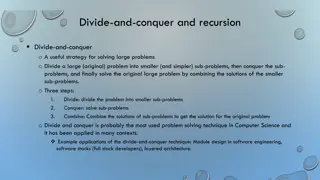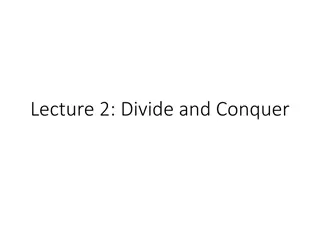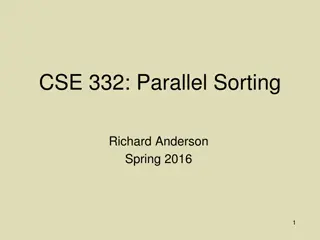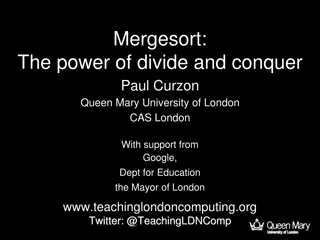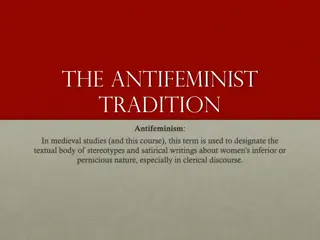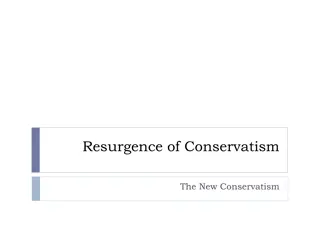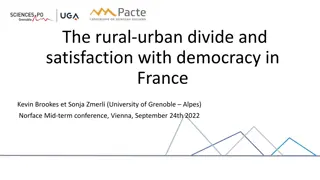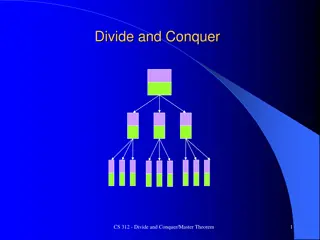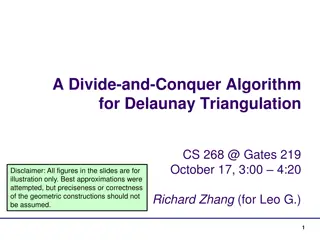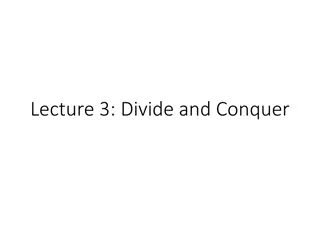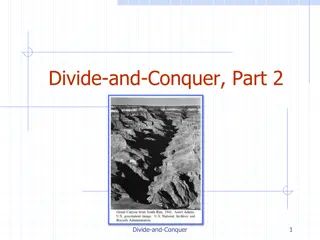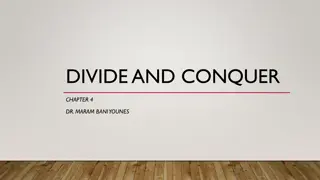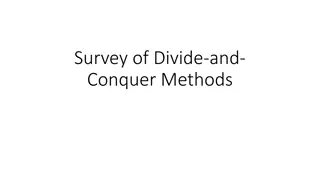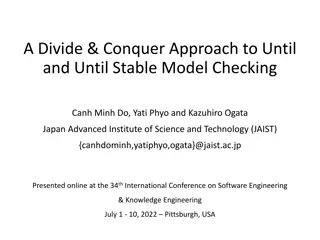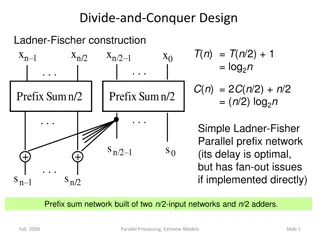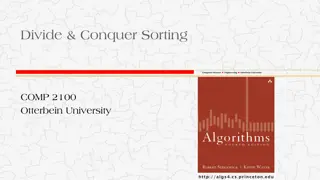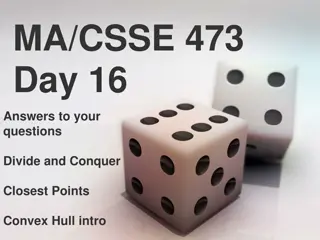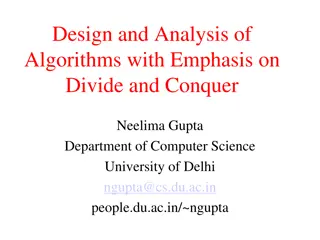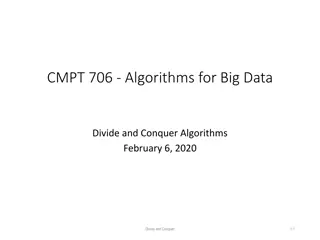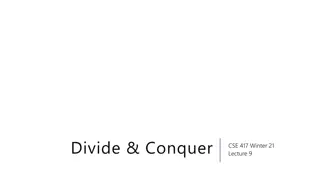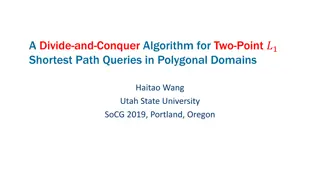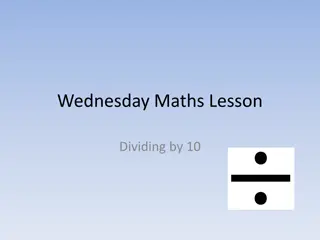Global Challenges Faced by Unreached People Groups
The top 20 unreached people groups face significant geographical, urban, ideological, social, and people challenges. The 10/40 Window encompasses areas with the highest concentration of unreached populations. Urbanization, diverse belief systems, social issues, and the lack of Christian presence con
0 views • 37 slides
Study Group How to Efficiently Divide the Workload
This article will guide you through effective strategies for dividing the workload in your study group, ensuring everyone contributes meaningfully and reaps the full benefits of group study with Explain Learning. Know more \/\/explainlearning.com\/blog\/study-group-efficiently-divide-workload\/
1 views • 4 slides
Understanding Critical Stylistics: Tools and Application
Critical Stylistics (CS) is a method that delves into the ideological underpinnings of texts through the analysis of linguistic features. Developed by Jeffries, CS focuses on uncovering implicit ideologies embedded in texts by examining stylistic choices. By integrating stylistics and critical disco
2 views • 28 slides
Understanding the Cold War: Phases and Perspectives in B.A. IV Semester
Cold War, characterized by economic, political, and military competition between the US and Soviet Union, stemmed from ideological differences leading to global conflicts and proxy wars in the Global South, ultimately fueling neo-colonialism and neo-imperialism.
1 views • 15 slides
Evolution of Modern Literature in the 20th Century
The Modern Age in literature emerged in response to the Victorian era, marked by a shift in attitudes towards life and society. Influenced by historical, economic, and ideological factors such as World Wars, capitalism, and the disintegration of empires, Modern Literature explored new themes and sty
1 views • 14 slides
Understanding Conservatism: Origins and Principles
Conservatism emerged as a reaction to the upheaval of the French Revolution, valuing tradition, security, and social order. It emphasizes the preservation of traditional institutions and stability, with roots in the beliefs of Edmund Burke. Key features include a focus on human imperfection, traditi
0 views • 21 slides
Terrorism: A Global Threat in International Politics
The rise of terrorism as a global menace is a significant factor in contemporary international politics. Fueled by advancements in technology and ideology, terrorism poses a formidable challenge, exemplified by events like the 9/11 attacks. Efforts are needed to combat terrorism on both national and
0 views • 24 slides
Divide and Conquer Algorithm Explained
Divide and Conquer algorithm involves dividing a problem into smaller sub-problems, solving them, and combining the solutions to solve the original problem efficiently. The concept is explained through examples of finding maximum and minimum elements in a set, and a detailed algorithmic approach is
1 views • 22 slides
Divide and Conquer: A Strategy for Problem Solving
Divide-and-conquer is a powerful problem-solving technique in Computer Science where a large problem is divided into smaller sub-problems, conquered individually, and then combined to solve the original problem. Through three steps - Divide, Conquer, and Combine - complex problems can be efficiently
3 views • 18 slides
Algorithm Design Techniques: Divide and Conquer
Algorithm design techniques such as divide and conquer, dynamic programming, and greedy algorithms are essential for solving complex problems by breaking them down into smaller sub-problems and combining their solutions. Divide and conquer involves breaking a problem into unrelated sub-problems, sol
1 views • 13 slides
Understanding Parallel Sorting Algorithms and Amdahl's Law
Exploring the concepts of parallel sorting algorithms, analyzing parallel programs, divide and conquer algorithms, parallel speed-up, estimating running time on multiple processors, and understanding Amdahl's Law in parallel computing. The content covers key measures of run-time, divide and conquer
1 views • 40 slides
Understanding Mergesort: The Power of Divide and Conquer in Sorting Algorithms
Explore the concept of mergesort, a divide-and-conquer algorithm that efficiently sorts arrays by splitting them into smaller arrays and merging them. Learn how mergesort works, the role of the merge algorithm, and the computational thinking behind it. Practical teaching methods and resources are al
1 views • 17 slides
Introduction to Divide and Conquer Algorithms
Explore the Divide and Conquer method in algorithm design, focusing on Mergesort as a fast sorting recursive algorithm. Learn how to divide input into smaller parts, solve them recursively, and merge the results to obtain the final solution. Dive into the key ideas, steps, and intricacies of Merge o
2 views • 59 slides
Unveiling the Antifeminist Tradition: Ideological Roots, Textual Sources, and Female Nature
Explore the antifeminist tradition in medieval studies through a deep dive into its ideological roots, main textual sources, and portrayal of female nature. Discover how stereotypes and satirical writings about women's perceived inferiority have persisted throughout history, informed by clerical, in
0 views • 9 slides
The Divided States of America: A Look at Party Polarization
The images depict the growing party polarization in American politics, showing the widening gap between Republicans and Democrats since the 1980s. The data visualizations illustrate how the ideological divide has evolved over the years, culminating in high levels of animosity and competition between
0 views • 48 slides
The Resurgence of Conservatism in America
The resurgence of conservatism in America has brought about a clear distinction between conservative and liberal ideologies. Conservatives emphasize limited government intervention, promoting free-market principles, individual liberty, and moral values. On the other hand, liberals advocate for gover
0 views • 14 slides
The Rural-Urban Divide and Satisfaction with Democracy in France
This study delves into the rural-urban dynamics in France concerning satisfaction with democracy. It explores how place of residence influences political attitudes, particularly focusing on the discontent among rural dwellers. By examining various factors such as economic values, media discourse, an
0 views • 16 slides
Understanding the Divide and Conquer Technique in Computer Science
The Divide and Conquer approach is a powerful strategy used in computer science to break down large problems into smaller, more manageable subproblems. By recursively solving these subproblems and combining their results, this technique offers a structured way to tackle complex tasks efficiently. Th
1 views • 59 slides
Divide-and-Conquer Algorithm for Delaunay Triangulation
Delaunay triangulation using a divide-and-conquer approach involves sorting input sites, dividing them into halves, recursively building Delaunay for each half, adding cross edges between the halves, and recombining by removing certain edges. Key steps include building cross edges in linear time and
2 views • 48 slides
Cell Division Mechanisms in Prokaryotic and Eukaryotic Cells
Prokaryotic cells divide through binary fission, while eukaryotic cells undergo mitosis with nuclear division and cytokinesis. Prokaryotic cells lack a nucleus and divide by replicating DNA and forming two identical daughter cells. Eukaryotic chromosomes, associated with histone proteins, undergo co
0 views • 56 slides
Efficient Algorithms: Divide and Conquer Techniques
Using the Divide and Conquer approach, this lecture discusses strategies for efficiently solving problems such as counting inversions in arrays and integer multiplication. By dividing tasks into smaller subproblems, sorting, merging, and efficiently counting operations, the algorithms presented opti
1 views • 13 slides
Efficient Divide-and-Conquer Algorithms and Applications
Explore the power of divide-and-conquer algorithms through examples like integer arithmetic operations and the Maxima Set Problem. Learn how to improve multiplication efficiency using Karatsuba's algorithm. Understand the concept of maximum points in a set and how divide-and-conquer can efficiently
1 views • 11 slides
Divide and Conquer Algorithms - Dr. Maram Bani Younes
This chapter on divide and conquer algorithms introduces key concepts such as dividing the problem into smaller subproblems, solving them, and combining the solutions. It covers techniques like finding maximum and minimum elements, maximum contiguous subsequence sum, binary search, quick sort, merge
1 views • 30 slides
Enhancing Phylogenetic Analysis Using Divide-and-Conquer Methods
Large-scale phylogenetics presents challenges due to NP-hardness and dataset sizes. Divide-and-conquer methods like SATe, PASTA, and MAGUS enable efficient processing of large datasets by dividing, aligning, and merging subsets with accuracy. MAGUS, a variant of PASTA, utilizes a unique alignment me
0 views • 15 slides
Understanding Divide and Conquer Algorithm for Maximum Subarray Sum
Explore the concept of divide and conquer in solving the maximum contiguous subarray sum problem. Learn how to split the array, solve parts recursively, and combine answers efficiently. Discover the limitations of a brute force approach and delve into edge cases to optimize your algorithm. Conquer t
0 views • 26 slides
Impact of Digital Communication on Social Inequality
The impact of digital forms of communication in a global context highlights the existence of a digital divide based on social inequality, particularly regarding access to information and communication technologies. This digital gap is evident within countries like the UK, where disparities exist bet
2 views • 12 slides
Divide & Conquer Approach to Model Checking
Addressing the state space explosion issue in model checking, this work by Canh Minh Do, Yati Phyo, and Kazuhiro Ogata introduces a divide & conquer approach focusing on until and until stable properties. The research extends techniques to handle these properties effectively, emphasizing mitigation
2 views • 17 slides
Parallel Prefix Networks in Divide-and-Conquer Algorithms
Explore the construction and comparisons of various parallel prefix networks in divide-and-conquer algorithms, such as Ladner-Fischer, Brent-Kung, and Kogge-Stone. These networks optimize computation efficiency through parallel processing, showcasing different levels of latency, cell complexity, and
1 views • 21 slides
Understanding Divide and Conquer Sorting at Otterbein University
Explore the concept of Divide and Conquer sorting in Computer Science at Otterbein University. Learn about the MergeSort and QuickSort algorithms, the design paradigm behind them, and steps involved in MergeSort. Discover how partitioning and merging play crucial roles in sorting sequences efficient
0 views • 38 slides
Divide and Conquer Algorithm Challenges in Computer Science
Design efficient divide and conquer algorithms for finding maximal points in a list, detecting elements in an increasing sorted array, and determining the largest value across pairs of integers. Improve upon runtimes of existing algorithms for enhanced computational efficiency.
1 views • 4 slides
Understanding Closest Points and Convex Hull in Divide and Conquer Algorithms
Exploring the divide-and-conquer approach to solving problems like finding the minimum distance between points on an xy-plane, and understanding concepts such as Gray Code and Hamiltonian Cycles in algorithm design. Dive into lexicographic permutations, efficient calculations, and examples seen in c
1 views • 16 slides
Algorithms Design and Analysis with Divide and Conquer Approach
Explore the intricacies of algorithm design and analysis, with a focus on divide and conquer techniques. Delve into topics such as iterative and recursive algorithms, writing summations, divide and conquer strategy, and more. Discover how to compute large numbers, polynomials, perform searching and
1 views • 15 slides
Understanding Divide and Conquer Algorithms for Big Data
Divide and Conquer Algorithms are a powerful paradigm in computer science where a problem is broken down into smaller parts, solved individually, and then combined to solve the original problem. This approach is exemplified in concepts like fast multiplication algorithms and finding the kth element
1 views • 27 slides
Exploring Divide and Conquer Paradigm in Algorithm Design
Discover the Divide and Conquer approach in algorithm design through concepts like Merge Sort and Counting Inversions. Learn how to split instances into subparts, solve them recursively, and combine the answers to optimize algorithm efficiency.
1 views • 43 slides
Understanding Divide and Conquer Algorithms in Computer Science
In the recent lecture, we revisited topics such as the exam review, data compression, and mergesort. We also delved into a captivating puzzle set on the planet Og, exploring the logic behind truth-telling and lying natives. Furthermore, we discussed the transformation of recursive functions into non
2 views • 36 slides
Divide-and-Conquer Algorithm for Two-Point Shortest Path Queries in Polygonal Domains
In this research presented at SoCG 2019, a new divide-and-conquer algorithm is proposed for efficiently handling two-point shortest path queries in polygonal domains. The algorithm offers significant improvements in preprocessing space and query time compared to previous methods, making it a valuabl
1 views • 19 slides
Learn to Divide by 10 - Wednesday Maths Lesson
This Wednesday Maths lesson focuses on dividing by 10, teaching students how to divide numbers by sharing them into equal parts. The lesson includes visual aids, a division symbol explanation, counting in 10s practice, a trick to easily divide by 10, and examples to reinforce the concept. Students a
0 views • 9 slides
Understanding the Cold War: Origins, Consequences, and Ideological Conflicts
Explore the origins, consequences, and ideological conflicts of the Cold War through key events like the Iron Curtain, Berlin Airlift, Korean War, and Cuban Missile Crisis. Learn about communism, democracy, and the impact of beliefs and ideals on attempts to stop the spread of communism during this
0 views • 16 slides
Global Conflicts and Revolutions: A Historical Perspective
The turbulent events of the 20th and 21st centuries, from the aftermath of WWI with the Treaty of Versailles to the devastating Rwandan Genocide in 1994, have shaped our world through wars, genocides, and ideological clashes. The rise of leaders like Hitler, the tragedy of Pearl Harbor, the Korean W
0 views • 7 slides
The Growing Divide: North vs. South in Antebellum America
Economic disparities between the agrarian North and the slave-dependent South led to growing tensions, with the North's industrial progress conflicting with the South's reliance on plantation economy and slave labor. Disputes over slavery, territorial expansion, and political power further fueled th
0 views • 16 slides
